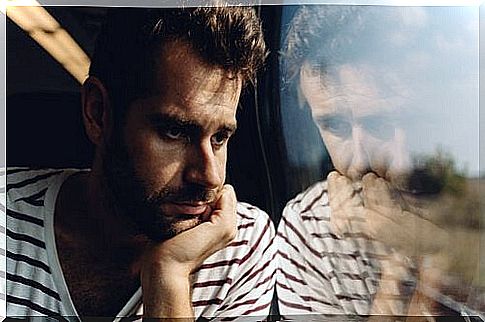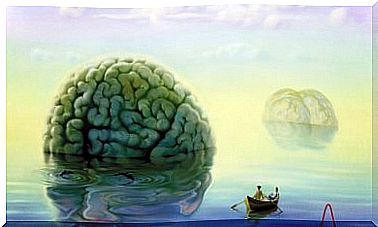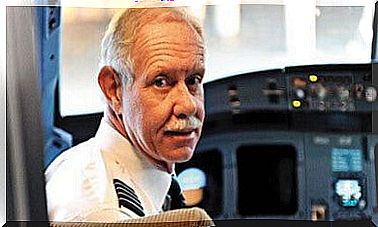Existential Emptiness: The Feeling That Life Is Meaningless

Life has no meaning. This is the main belief of those who experience the painful feeling of ‘living to live’, the weight of injustice and a kind of disconnection from everything around them. It’s what we call existential emptiness.
They are generally reflective people who explore issues of great importance, such as death or lack of freedom. However , they cannot get rid of a deep existential emptiness that engulfs them more and more. An emptiness that society feeds through its messages related to individual values and immediate satisfaction.
Often, they are also those who navigate the search for pleasure with the sole purpose of anesthetizing their suffering. The difference is that they don’t notice the emptiness they experience.
For both, there are no answers to the meaning of life. Nothing fills them, nothing satisfies them, and this ends up imprisoning them in a psychological state of great suffering. In most cases, this situation leads to deep depression or self-destructive behavior.
Existential emptiness is the spiral of absurdity and the result of recognizing yourself as someone who sees the world from a different perspective to the detected inconsistencies, or as someone who has ‘let go’ by the pursuit of pleasure to avoid suffering. A very widespread phenomenon today. Let’s go deeper.

In the depths of the abyss
The development of a meaning in life can be frustrated when goals and objectives are not completed or met; when the clash between expectations and reality is so strong that only disappointment appears, or when crisis situations threaten the feeling of security and certainty, and the person does not have the proper tools to deal with them.
All of this leads to a deep state of existential frustration that drains the person from the inside and sometimes leads to a painful abyss. It is as if there is a dense desert inside, one in which the illogical dominates existence and almost all the capacity to connect and feel others is lost.
For psychologist Benjamin Wolan, this state was called existential neurosis. He defined it as “the inability to find meaning in life, the feeling that there is no reason to live, to fight, to wait… A feeling of being unable to find a goal or direction in life, the feeling that even that individuals strive very hard in their work, in reality they have no aspirations”.
Some authors, such as psychotherapist Tony Anatrella, point to the constant search for ego satisfaction as the cause of this loss of meaning, since they are selfish actions that impede the capacity for personal transcendence.
Existential Void: The Supremacy of Individual Values
Other authors claim that the loss of meaning is associated with the disappearance of the other, the supremacy of individualistic values and the attainment of pleasure as a mistaken mechanism for being happy. In this way, the person clings to their individual desires and the sense of social references, such as coexistence, solidarity or mutual respect, among others, is diluted.
Thus, when reality is confused and the means to achieve happiness become ends in themselves, there is a risk of falling into an existential void. Short-term pleasant emotions, such as pleasure or joy, provide satisfaction but not self-fulfillment, and like all pleasure, carry the danger of creating slavery or addiction.
Somehow, man has the need to do something with his life that is not only good, but also done for himself. Therefore, the meaning of life is related to the destination you want and need. Through this desire, man seeks to offer freedom to his own development, because when he lives fully, his freedom transcends the limits of his immanence and understands that the meaning of his life is not only reduced to something material and finite, but it transcends, it will further.
The problem is when this does not happen as expected, when circumstances do not meet the expectations of your life project and the ‘lack of meaning’ takes you to the abyss of existential emptiness.

the noetic dimension of man
According to Swiss psychiatrist Viktor Frankl, man has three main dimensions:
- Somatic dimension: comprises the body and biological field.
- Psychic dimension: this is the psychodynamic reality, that is, the psychological and emotional universe.
- Noetic dimension or spiritual dimension: it encompasses the phenomenological realms of the soul. Therefore, this dimension transcends the other two. Furthermore, thanks to it, the human being can integrate the harmful experiences of existence and develop a healthy life on a psychological level.
Thus, when a person experiences a deep state of boredom, discouragement and gets lost in the labyrinth of his existence, he has conflicts in his spiritual dimension. She is not able to integrate her wounds nor can she identify them. In this way, he cannot find a reason for his existence, so he drowns in suffering and experiences a lack of meaning, coherence and purpose.
Frankl claims that this emptiness is at the root of many mental disorders. That is, the rupture in the noetic or spiritual dimension, that feeling that existence is meaningless, is expressed in the psychological dimension through three main groups of symptoms:
- Depressive symptoms.
- Aggressive symptoms with or without uncontrolled impulses.
- Addictions.
Thus, people trapped in the existential void feel as if something has covered their eyes and feelings with an unconscious veil, which prevents them from finding the meaning of their lives and which leads them to chronic dissatisfaction and despair. So what to do to find this meaning?
Existential Void: In Search of a Meaning
According to Swiss psychologist Carl Jung, man needs to find meaning to continue his path in the world. Therefore, without that meaning, you are lost in a no man’s land and wandering in the labyrinth of existence.
Frankl emphasizes that the path to the meaning of life is mediated by values and that social conscience is the instrument that reveals it. Now, although values arise from personal intimacy, they end up culminating in universal values, which coincide with cultural, religious or philosophical systems.
Therefore, the connection with the other is important in order not to lose the meaning of life, as well as the maintenance of affective bonds. However, all the responsibility for being happy should not be placed on them. In a way, a meaningful life is a life rooted in the social.
The French sociologist and philosopher Durkheim very well explains the problem of social displacement and the consequences it entails: “when a person individualizes beyond a certain point, when he radically separates himself from other beings, men or things, he closes himself to them sources from which it normally should feed, and has nothing to get involved with. By creating an emptiness around you, you also create an emptiness within yourself and you have nothing else to reflect on but your own misery. There is no other thought than the nothingness that is in it and the sadness that is its consequence”.

The important thing is the meaning we give to life
Now, it is not a matter of looking for the culprits or saviors, but rather of adopting a reflective and responsible attitude that allows us to investigate within, find a purpose and get out of this existential emptiness. Because in reality, there is no question more complicated than the meaning of life for us.
It is convenient to state that there are several ways to define the meaning of life and, even, each one of us can change our life purpose throughout our existence. So what matters, as Viktor Frankl said, is not the meaning of life on a general level, but the meaning we give it at a given moment.
Furthermore, Frankl states that we should not investigate the meaning of life, but understand that we are the ones who give it purpose. That is, we can challenge life by responding with our own life. This means that responsibility is the inner essence of our existence.
Even though we’ve invested time, energy, effort, and heart, life sometimes isn’t fair. At these times we get discouraged and this is totally understandable. However, we have two options: accepting that we cannot change what happened, that there is nothing to be done and that we are victims of circumstances, or accepting that we cannot change what happened, but that we can change our attitude about it. .
Conclusion
Therefore, we are responsible for our actions, our emotions, thoughts and decisions. And for that reason, we have the option of deciding why, to what or to whom we should hold ourselves responsible.
Therefore, the meaning of life is always changing, it never ceases. Every day and every moment, we have the opportunity to make decisions that will determine whether we are subject to our own circumstances or whether we act with dignity, listening to our true selves responsibly and freed from the traps of pleasure and immediate satisfaction.









